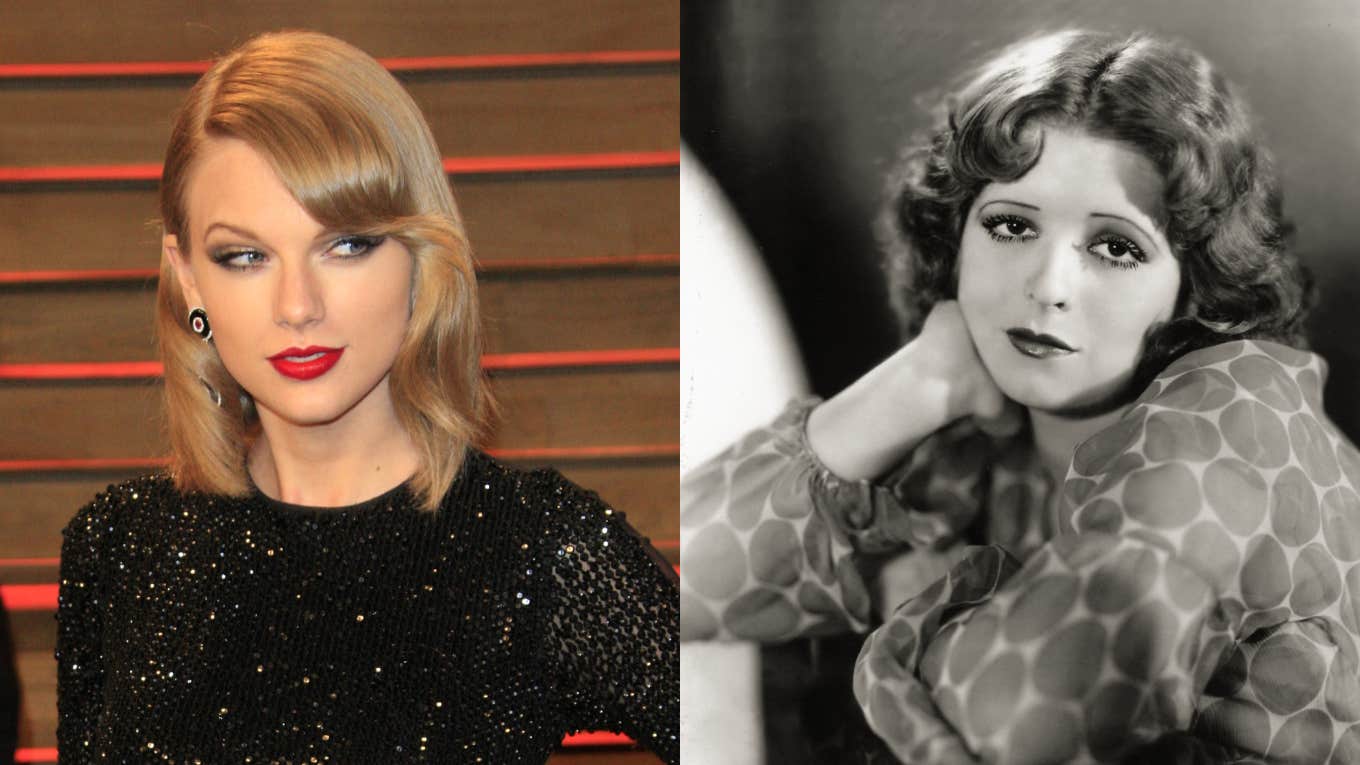The 3 ‘Easter Eggs’ From Taylor Swift’s Song ‘Clara Bow’ That Give Intimate Insight Into Her Stardom
How is Clara Bow masterfully woven into the framework of "The Tortured Poets Department?"
 Kathy Hutchins / Wikimedia Commons / Shutterstock
Kathy Hutchins / Wikimedia Commons / Shutterstock From scrutiny of womanhood to expectations of stardom, 1920s silent film star Clara Bow and artist Taylor Swift have lived shockingly similar lives.
Not only did the pair have a similar whirlwind rise to fame, but they also struggled with public scrutiny throughout their lives in similar arenas — attacks on womanhood, their (private and public) dating lives, and the idolization of their characters.
Since the album, "The Tortured Poets Department," was announced on February 4 during her Grammy acceptance speech, fans have been anxiously awaiting the reveal of Bow’s significance on the album, especially given the webs of “easter eggs” already untangled by fans diving deep into Bow’s history.
So, amidst the hype of the double album reveal and the resurgence of old lore with tracks like “thanK you aIMee,” how did Swift carefully weave Bow into her story?
The 3 ‘Easter Eggs’ from Taylor Swift’s song ‘Clara Bow’ that give intimate insights into her stardom:
1. The line ‘picking a rose’ alludes to public scrutiny and the dark side of stardom
“You look like Clara Bow / In this light, remarkable / All your life, did you know / You’d be picked like a rose.”
The whirlwind of fame is something many celebrities grapple with as the cycle of stardom that was once hopeful turns toxic. Fans like Aly Kima on TikTok were quick to relate this sentiment to the lyrics on the track, calling the “picking of a rose” the unfortunate parallel to fame's inevitable fate.
With such beauty and excitement, celebrities make their way into the spotlight, similar to a rose in a garden. They’re admired and celebrated, only to be tossed out when their image slowly fades like the bloom of a cut rose.
Bow was brought into stardom in her “flapper” era to serve as an exciting spectacle for audiences but was scrutinized for it later in life when misguided rumors recast her sexuality into a weaponized form.
Like flowers, we remove celebrities from their natural environments to be a spectacle — only to be frustrated when they wilt or transform into something that doesn’t serve us.
2. Direct mentions of both Clara Bow and Stevie Nicks reference the 50-year life cycle of fame
“You look like Stevie Nicks / In ‘75, the hair and lips / Crowd goes wild at her fingertips / Half moonshine, a full eclipse.”
Starting with references to Bow, then Nicks, and later to herself in the final verse, Swift paints a picture of Hollywood stardom throughout history — and the inevitable life cycle of celebrities.
“Clara Bow was the ‘It girl’ in 1925. She then references Stevie Nicks in 1975, 50 years later,” TikTok creator and fan @lukeboxsell wrote in a recent video. “Finally, she ends with Taylor Swift. The album was released in 2024, 49 years since the last reference.”
Each star, who’s considered the “It girl” of their time, inevitably found themselves removed from the spotlight to make room for the next Hollywood sensation. Every 50 years, the cycle of stardom continues, making room for the next pop star to claim fame.
“Is she saying that she feels this is her last year of being famous and loved? Since next year will be 50 years, continuing the pattern in the previous verses where another woman will become the ‘It girl’?”
Others online speculated that Swift’s direct mention of herself at the end of the song — “You look like Taylor Swift / In this light, we’re loving it / You’ve got edge, she never did / The future’s bright, dazzling” — is a reflection of the public’s need to remove her from the spotlight. Imposing similar expectations on the next “It girl,” they build up the perfect new superstar while simultaneously breaking down the last.
 Fred Duval / Shutterstock.com
Fred Duval / Shutterstock.com
Or is this a reference to Olivia Rodrigo, the pop star that many fans have dubbed the “Gen Z Taylor Swift”? Does she acknowledge the constant comparison of the two of them, including the “setting of the stage” for her to take over the world of pop?
3. Swift references the beauty standards famous women are held to and the toxicity of idolization and Hollywood
While Bow was often criticized, demeaned, and rejected for her “non-traditional” Hollywood look, Swift’s acknowledgment of a “heavenly” demeanor seems to be about much more than just scrutiny over physical beauty standards imposed upon women. Of course, Swift has been ridiculed for her own physical appearance in the past, but to say she’s faced similar barriers because of her appearance would be misguided.
“Beauty is a beast that roars down on all fours / Demanding more / Only when your girlish glowed flicks as just sold / Do they let you know?”
 Photo: Liam Goodner / Shutterstock
Photo: Liam Goodner / Shutterstock
Not only are women, especially idolized women or those in Hollywood, expected to stay aligned with ever-changing physical beauty standards, but they’re expected to maintain a demeanor, character, and stature that aligns with that of others in the industry.
“It’s hell on Earth to be heavenly /Them’s the breaks, they don’t come gently.”
Don’t be cringy, don’t be crude, and don’t be overtly sexual with a young audience. Don’t glamorize weight gain or weight loss, and definitely don’t adopt a celebrity archetype that pushes too many boundaries. It’s this illusion of “beauty” and the antiquated stereotypes of feminity that resonate with Swift regarding Bow's career.
Adding fuel to the speculation, Swift's Bow-like character in the “Bejeweled” music video and her “Bow-esque” makeup in the upcoming “Fortnight” video has fans fixating on what it all means for her legacy. Does she foresee a similar fate as Bow, or is she urging fans and critics to acknowledge her humanity under her celebrity persona?
Zayda Slabbekoorn is a News & Entertainment Writer at YourTango who focuses on health & wellness, social policy, and human interest stories.

